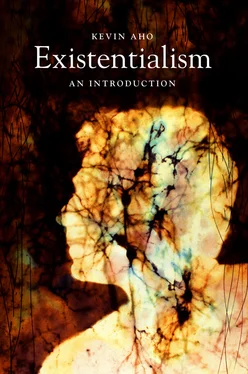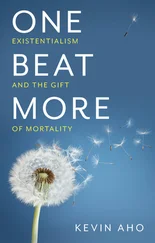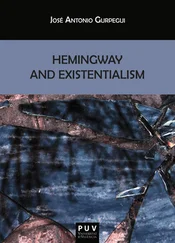It is important to note, however, that existentialists break with Husserl in terms of understanding how phenomena are encountered. Husserl contends that through a series of intellectual reductions (what he calls the ‘ epoché ’), the phenomenologist can bracket out or negate the worldly prejudices of the ‘natural attitude’ that tend to distort what is given in our conscious experience. By bracketing out these prejudices, the phenomenologist is able to arrive at a ‘presuppositionless starting point’ and attend to what is given to consciousness in a way that is pure and undistorted. Existential phenomenologists reject the possibility of a complete reduction, arguing that what is given in experience is always colored by a particular historical world, where ‘world’ is understood not as a spatial container or the sum total of objects but as a background of affective meanings that we are always already involved in. As we go to work, talk with friends, shop, and travel we are immersed in this background which allow the things that we deal with to show up and matter to us in the ways that they do. And it is impossible to bracket out or negate our involvement in this background because it constitutes what it means to be human. Against Husserl's conception of the reduction, then, existential phenomenologists argue that there is no pure, undistorted consciousness that constitutes the world after the natural attitude has been bracketed out. “The most important lesson which the reduction teaches us,” says Merleau-Ponty, “is the impossibility of a complete reduction” (1962, xiv). What appears to us in lived experience is always colored by the worldly significance we grow into and intentionally attribute to things. We are, for this reason, “ condemned to meaning ” (xix).
As we will see in proceeding chapters, interpreting existence in terms of our situated involvement in a world of meanings creates a new way of understanding the self. Whereas traditional philosophy has been largely concerned with ‘ what we are’ as a particular kind of entity or substance — an autonomous mind, a causally determined body, or some combination of the two — existential phenomenologists are concerned with ‘ how we are.’ Heidegger is helpful by referring to human existence in terms of the colloquial German expression ‘ Dasein .’ For Heidegger, ‘Dasein’ is a term that expresses our unique way of being and avoids the usual interpretation of the self as an entity or substance with ‘what-like’ properties. “When we designate this entity with the term ‘Dasein,’” says Heidegger, “we are expressing not its ‘what’ (as if it were a table, house, or tree) but its being” (1962, 67). On this account, humans are distinct because we already embody a pre-reflective understanding of how to exist in the world, and this understanding can never be made theoretically explicit. It is a result of being ‘thrown’ into a shared social context that tacitly shapes how we make sense of things such as equipment, our social identities, and our relationships with others. This means Dasein can only be understood in terms of its concrete worldly involvements, and it helps explain why Heidegger refers to being-in-the-world as a “unitary phenomenon,” where “self and world belong together in the single entity, the Dasein” (1982, 297). Understanding existence this way means that phenomena are always given to us as ‘interpretations’ because they have already been colored by our own way of being-in-the-world. As Merleau-Ponty contends, it is “naïve” for philosophers to assume that we can adopt a completely detached and objective standpoint (1962, vii — ix). This is because any theoretical description or explanation of things presupposes one's own situated and embodied point of view.
The existentialist emphasis on situated and pre-reflective understanding not only breaks with the traditional idea of the cognizing mind as the source of genuine truth and knowledge; it also allows us to rethink the role of the body. As we will see in more detail later, existential philosophers like Heidegger, Marcel, Sartre, Beauvoir, and Merleau-Ponty all explore the ways in which the ‘lived body’ is itself the source of pre-reflective understanding or knowledge that endows things with meaning and value. On this account, the body is not regarded as a material object extended in space and set against the dispassionate gaze of the subject. The body is how I am , a relational way of being-in-the-world that dissolves the subject/object opposition altogether. This means I do not ‘have’ a body as if it were a thing or object I possess. Rather, as Marcel proclaims, “I am my body” (1950, 103). In the course of my everyday life, in seeing, hearing, touching, and sensing, the body is already entwined with worldly meanings, and this intra-worldly relation always underlies our theoretical understanding of things. We do not, for instance, interpret ourselves as a man or a woman because we are born with a particular anatomy. We identify ourselves in terms of sexual differences only on the basis of the sociocultural background and the embodied meanings that we grow into. This is why, in The Second Sex , Beauvoir says that “one is not born , but rather becomes a woman” (1952, 301, my emphasis). It is through being acculturated into the oppressive social patterns, institutions, and prejudices of Western culture that a woman learns how to interpret herself as an inferior and subordinate being. This does not mean that biology and anatomy are unimportant to questions of personal identity. It simply means that biological facts are always derived from the relational background of social norms and practices that we are immersed in as embodied ways of being. It is this situated relation that makes it possible for us to interpret ourselves as the particular persons that we are, as men or women, as sick or healthy, as charming or boorish and so on. We will discuss in more detail phenomenology's contribution to existentialism in later chapters, but we can conclude by summarizing the key points of the insider's perspective.
First, existentialists are in agreement that philosophy does not begin from a standpoint of detachment and objectivity because it can never address the concrete concerns of the existing individual. This means that any account of what it means to be human has to start from my own first-person experiences and the situated understanding that I have of myself. Indeed, as the phenomenologists have shown, I have no choice but to start out from the insider's perspective, from my sense of things as they initially appear to me from my own perspective and modes of apprehension.
Second, existentialists reject the configuration of the human being as a self-contained subject that is separate and distinct from objects. In my everyday life I am bound up with the meanings, values, and practices of the world. As an embedded way of being, I am limited and constrained by the world that I find myself in, and this influences how I interpret myself and make sense of who I am. This means that any attempt to address the question of human existence must also address how I am situated in a shared world.
Finally, the standpoint of detachment and objectivity cuts us off from the affective meaning and worth of things. When I adopt the standpoint of objectivity, I am often left in a dispassionate state, where I am alienated from what matters to me as an individual, and the world shows up as a “gray collage of facts” (Bergmann 1983, 41). Detached in this way, my choices and actions are stripped of their emotional significance. I may be able to know what is objectively true, but without feelings I cannot know what is true for me, because it is the passion, focus, and intensity, not the correctness, of my choices that determine their truth. As Kierkegaard says, “In making a choice, it is not so much a question of choosing the right way as of the energy, the earnestness, [and] the pathos with which one chooses” (1946a, 106).
Читать дальше












